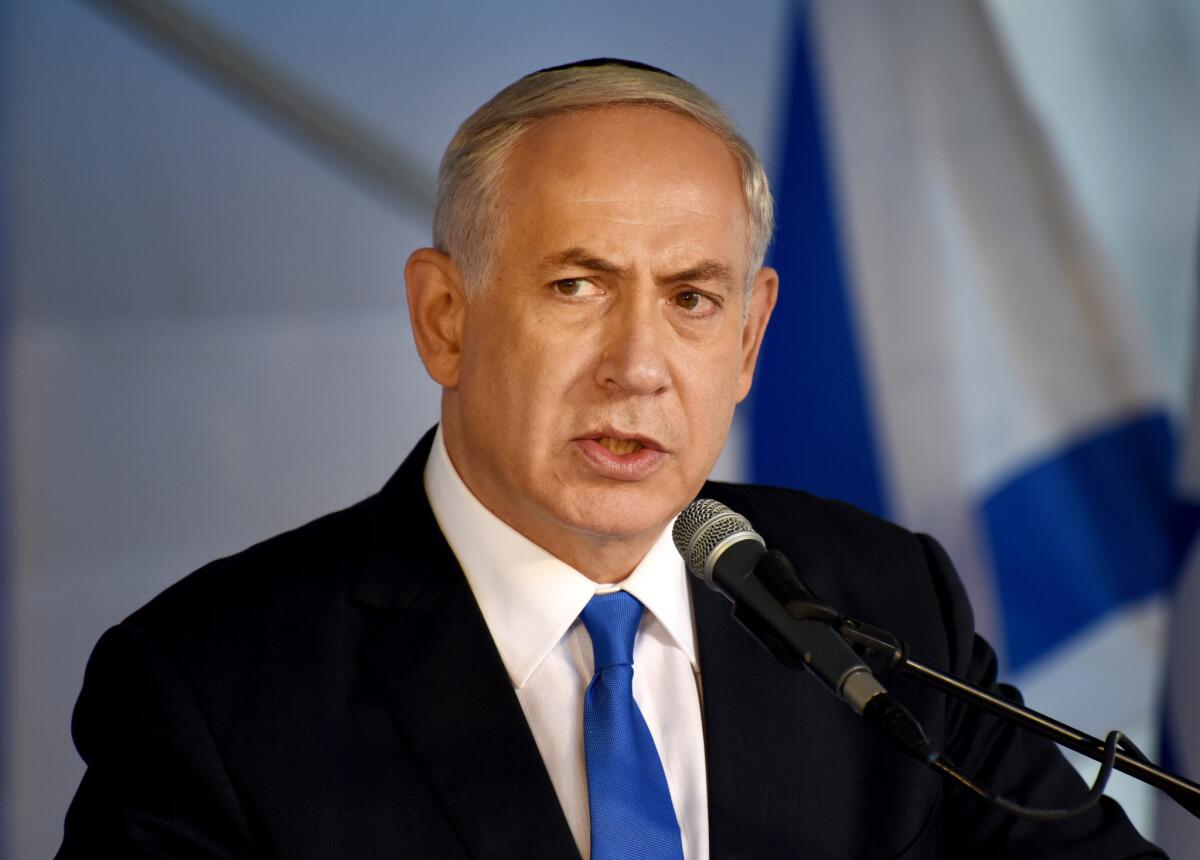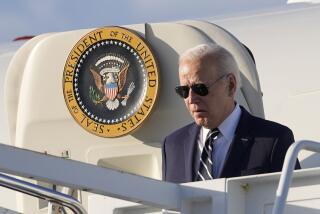Obama and Netanyahu urged to revive relationship, but can they get along?

Israeli Prime Minister Benjamin Netanyahu and President Obama will meet Monday at the White House for the first time in a year.
In full-page U.S. newspaper ads this week, the World Jewish Congress implored Israeli Prime Minister Benjamin Netanyahu and President Obama to “reinvigorate the U.S.-Israeli relationship” when they meet Monday at the White House for the first time in a year.
Translation: Can you guys start getting along?
Supporters in both countries are urging the two leaders to reset their stormy relationship after 6 1/2 years of turmoil. Relations between the two plunged this year when Netanyahu sought unsuccessfully to end U.S. support for the landmark international agreement aimed at preventing Iran from obtaining a nuclear weapon.
Now, with the Iran deal on its way to implementation, supporters of Israel and political allies of Obama fear the split is jeopardizing U.S. security support for Israel at a time of increased Middle East turbulence.
It also is bitterly dividing parts of the American Jewish community into Netanyahu and Obama supporters, creating “dissonance that’s unprecedented,” said Ilan Goldenberg, a former Obama administration official. “I think all of them would like it to calm down.”
Aides to the two leaders insist they will behave professionally and that the poor chemistry between them won’t affect their work.
The personal relationship is “almost completely immaterial to the relationship between our two countries,” White House Press Secretary Josh Earnest said Thursday.
Yet the strains continue.
A new blowup came Thursday when it was disclosed that Netanyahu’s choice to be his top public diplomacy official had accused Obama of anti-Semitism and said that Secretary of State John F. Kerry had the intellect of a 12-year-old.
After a spokesman for Kerry said the comments by Ran Baratz, a conservative academic, were “troubling and hurtful,” Netanyahu said he was reconsidering the appointment.
Against this backdrop, the two leaders will grapple with a series of major issues, including new military aid to Israel, policing of the nuclear deal with Iran, and Netanyahu’s future role in U.S. domestic political issues.
They’re not expected to announce major news afterward but could reach important decisions on several topics. Here are several:
Nuclear deal: Obama and Netanyahu want each other’s cooperation to help monitor Iran’s compliance, but differing goals could make that tricky.
The agreement will lift tough economic sanctions on Iran, probably beginning in mid-2016, if Tehran ends or scales back sensitive nuclear activities for 10 to 15 years. Iran will retain much of its nuclear infrastructure, however, and can continue low-level enrichment of uranium, which can be used as bomb fuel if enriched to high levels.
Obama would like Netanyahu’s commitment to not undermine the accord. Netanyahu would like Obama’s promise to strictly enforce the deal and to make sure the six world powers who negotiated it will reimpose sanctions if Iran violates its terms.
Israeli officials would like U.S. officials to take part in a joint organization -- in addition to the International Atomic Energy Agency, the United Nations’ nuclear watchdog agency -- to monitor the agreement, David Makovsky, a former Obama administration advisor, wrote recently.
But U.S. officials may be reluctant, fearing Israel’s involvement could give it the ability to undermine the deal, wrote Makovsky, who is now with the Washington Institute for Near East Policy.
Military support: U.S. and Israeli officials are beginning negotiations on a 10-year military agreement that is expected to bring a large increase -- perhaps as much as 50% -- in the $3.1 billion Israel receives annually in U.S. military aid.
Some Israeli officials are describing this as U.S. “compensation” for the increased risks that they say Israel faces from the nuclear deal. U.S. officials insist the accord will make Israel safer, but they acknowledge the Middle East has gotten more dangerous and Israel needs more military hardware.
The Pentagon needs to bolster Israel’s arsenal in part because it is providing billions of dollars in arms to Persian Gulf Arab governments arrayed against Iran and Islamic State and is committed to ensuring that Israel maintains its military edge over them.
Some Israelis and members of Congress have urged the administration to give Israel a “bunker buster” bomb, called the Massive Ordnance Penetrator, that was designed to knock out Iran’s underground uranium enrichment facility at Fordo in case Iran ignores the deal and decides to race to a nuclear bomb capability.
But the Israeli military is not eager to get the giant bomb, so the discussion has turned to conventional arms, including more F-35 fighters, MV-22 Osprey transport aircraft, munitions and enhanced cyberwarfare capabilities.
The leaders won’t complete the military agreement Monday, but the Israelis are pressing the White House to say how much of an aid increase they will provide, according to Makovsky.
Domestic politics: Obama and fellow Democrats were outraged by Netanyahu’s public campaign against the nuclear deal, including his address to a joint session of Congress in March.
They believe he sided with Republicans, jeopardizing Democratic candidates, and want his commitment that he will stand above the partisan fray in the 2016 election.
Netanyahu has been unapologetic about his efforts to kill the deal. But he is attempting to mend fences with Democrats, knowing that bipartisan support in Congress has been a source of Israel’s influence in the United States.
After first agreeing to appear at the conservative American Enterprise Institute during his visit to Washington, Netanyahu also agreed later to speak at the Center for American Progress, a liberal think tank with ties to Obama and presidential candidate and former Secretary of State Hillary Rodham Clinton.
Netanyahu is “trying to get right with the full American political spectrum after the Iran deal, and several difficult years,” said Dylan Williams, government affairs director for J Street, a liberal pro-Israel lobby group.
Analysts expect Obama to largely dodge tough Israeli-Palestinian issues, including those related to the stalled peace negotiations and recent violence.
With prospects for agreement slight, “I don’t really think either leader wants to put the Israeli-Palestinian issue at the forefront of the agenda,” said Goldenberg, who is now with the Center for a New American Security research organization in Washington.
The two leaders are trying to limit the risks of the encounter by appearing before the news media only for a brief photo opportunity, rather than in a full news conference.
But even this brief appearance carries some danger: In 2011, Netanyahu further alienated Obama by seeming to lecture him in an Oval Office photo op.
Alon Pinkas, an Israeli analyst and former diplomat, predicts Monday’s meeting will be civil but won’t amount to a new start.
“Turning over a new leaf is not an option,” he said. “At best, it will be practical.”
For news about President Obama and the Obama administration, follow me on Twitter: @cparsons.
ALSO
A deluge strikes Jordan’s capital; flooding traps hundreds of people
Russia deploys antiaircraft missiles in Syria to protect its warplanes
Vladimir Putin orders suspension of Russian flights to Egypt after crash
More to Read
Start your day right
Sign up for Essential California for news, features and recommendations from the L.A. Times and beyond in your inbox six days a week.
You may occasionally receive promotional content from the Los Angeles Times.








